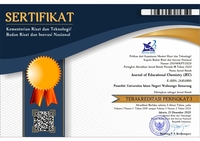The Profile of Students’ Self-Efficacy in Using Chemdroid Media in Thermochemistry Topics
DOI:
https://doi.org/10.21580/jec.2021.3.2.8469Keywords:
chemdroid media, self-efficacy, thermochemistryAbstract
Self-efficacy is one of the factors that affect learning achievement. This study has the aim of analyzing the self-efficacy profile of students in learning using Chemdroid (Chemistry on Android) media. This media is an android-based media for Thermochemical material. This research is descriptive research with a quantitative approach. The classes used in this study were 2 classes with 60 students. Both are randomly selected. The first class is the control class (C-Class) which carries out hybrid learning, as usual, namely face-to-face in class and online learning using WhatsApp groups. The second class is the experimental class (E-Class) with face-to-face in class and using Chemdroid media. The learning time and the teacher in this study were the same. The instrument used is a self-efficacy measuring instrument consisting of 3 main aspects with 22 statements adapted from previous research. The results of the study were then analyzed and categorized into 5 categories. The results obtained indicate that the profile of students’ self-efficacy of E-Class students is higher than other class.Downloads
References
Al-Hariri, M. T., & Al-Hattami, A. A. (2017). Impact of Students’ Use of Technology on Their Learning Achievements in Physiology Courses at the University of Dammam. Journal of Taibah University Medical Sciences, 12(1), 82–85.
Anderson, R. K. (1994). Pemilihan dan Pengembangan Media untuk Pembelajaran. Jakarta: Grafindo Pers.
Azwar, S. (2015). Penyusunan Skala Psikologi. Yogyakarta: Pustaka Pelajar.
Bandura, A. (1997). Self-Efficacy The Exercise of Control. New Yok: W.H Freeman and Company.
Boz, Y., Yerdelen-Damar, S., Aydemir, N., & Aydemir, M. (2016). Investigating the Relationships Among Students’ Self-Efficacy Beliefs, Their Perceptions of Classroom Learning Environment, Gender, and Chemistry Achievement Through Structural Equation Modeling. Research in Science & Technological Education, 34(3), 307–324.
Buzzetto-More, N. A., & Sweat-Guy, R. (2006). Hybrid Learning Defined. Journal of Information Technology Education, 5, 152–156.
Calik, M. (2013). Effect of Technology-Embedded Scientific Inquiry on Senior Science Student Teachers’ Self -Efficacy. Eurasia Journal of Mathematics, Science & Technology Education, 9(3), 223–232.
Cheung, D. (2014). The Combined Effects of Classroom Teaching and Learning Strategy Use on Students’ Chemistry. Journal of Research and Science Education, 45(1), 101–116.
Chigeza, P., & Halbert, K. (2014). Navigating e-Learning and Blended Learning for Pre-Service Teachers: Redesigning for Engagement, Access and Efficiency. Australian Journal of Teacher Education, 39(11), 132–146.
Daryanto. (2013). Media Pembelajaran: Peranannya Sangat Penting dalam Mencapai Tujuan Pembelajaran. Yogyakarta: Gava Media.
Dinther, M. Van, Dochy, F., & Segers, M. (2011). Factors Affecting Students’ Self-Efficacy in Higher Education. Educational Research Review, 6(2), 95–108.
Fitriyana, N., Wiyarsi, A., Ikhsan, J., & Sugiyarto, K. H. (2020). Android-Based-Game and Blended Learning in Chemistry: Effect on Students’ Self-Efficacy and Achievement. Cakrawala Pendidikan, 39(3), 507–521.
Fitriyana, N., Wiyarsi, A., & Sugiyarto, K. H. (2018). The Profile of Students’ Self-Efficacy on Hydrocarbon Hybrid Learning and Android-Based-Games. International Journal on New Trends in Education and Their Implications, 9(2), 1–15.
Heirdsfield, A., Walker, S., Tambyah, M., & Beutel, D. (2011). Blackboard as an Online Learning Environment: What Do Teacher Education Students and Staff Think?. Australian Journal of Teacher Education, 36(7), 1–16.
Hew, K. F., & Cheung, W. S. (2014). Using Blended Learning Evidence-Based Practices. Singapore: Springer.
Johnson, J. A., & Mckenzie, R. (2013). The Effect on Student Performance of Web-Based Learning and Homework in Microeconomics. Journal of Economics and Economic Education Research, 14(2), 115–126.
Julius, J. kinya, W. Twoli, N., & N. Maundu, J. (2018). Enhancement of Chemistry Self-efficacy of Students using Computer Aided Instruction among Secondary School Learners in Kenya. International Journal for Innovation Education and Research, 6(8), 79–90.
Meydanlioglu, A., & Arikan, F. (2014). Hybrid Learning in Higher Education. International Journal of Information and Communication Engineering, 8(5), 1292–1295.
Ormrod, J. E. (2003). Educational Pyschology: Developing Learners (4th ed.). Colorado: Pearson Education Inc.
Oyelekan, O. S., Jolayemi, S. S., & Upahi, J. E. (2019). Relationships Among Senior High School Students’ Self-Efficacy, Metacognition and Their Achievement in Chemistry. Cypriot Journal of Education Science, 2(2), 208–221.
Santrock, J. W. (2011). Educational Psychology (5th ed.). New York: McGraw-Hill.
Schunk, D. H., Pintrich, P. R., & Meecee, J. L. (2010). Motivation in Education: Theory, Research, and Applications (3th ed.). Colorado: Pearson Education Inc.
Solikhin, F. (2020). Pengembangan Alat Ukur Tingkat Efikasi Diri Siswa dalam Pembelajaran Kimia. Jurnal Pengukuran Psikologi dan Pendidikan Indonesia (JP3I), 9(1), 11–18.
Solikhin, F., Sugiyarto, K. H., & Ikhsan, J. (2018). The Measurement of Self-Efficacy in the Use of VICH-LAB in Electrochemistry. AIP Conference Proceedings., 1, 040002.
Yusuf, M. (2011). The impact of Self-Efficacy, Achievement Motivation, and Self-Regulated Learning Strategies on Students’ Academic Achievement. Procedia-Social and Behavioral Sciences, 15, 2623–2626.
Downloads
Published
How to Cite
Issue
Section
License
The copyright of the received article shall be assigned to the journal as the publisher of the journal. The intended copyright includes the right to publish the article in various forms (including reprints). The journal maintains the publishing rights to the published articles.
Authors are permitted to disseminate published articles by sharing the link/DOI of the article at the journal. Authors are allowed to use their articles for any legal purposes deemed necessary without written permission from the journal with an acknowledgment of initial publication to this journal.

This work is licensed under a Creative Commons Attribution-NonCommercial-ShareAlike 4.0 International License.


